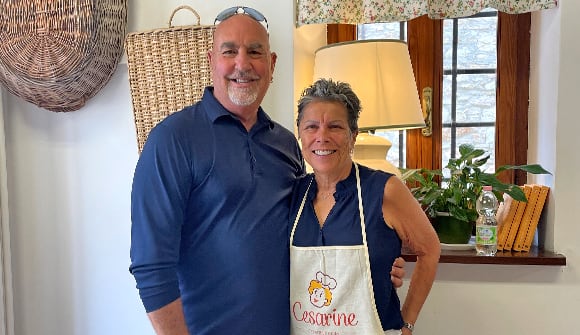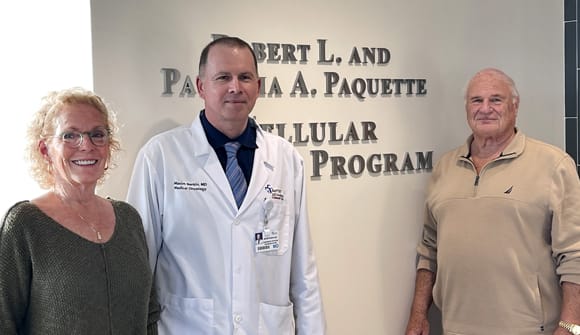'Game plan' for lung cancer
A path to victory against this difficult opponent.
Article Date:

In sports, most coaches agree you need a good game plan to defeat a tough opponent. Similarly, medical experts say executing the right strategy in the treatment of cancer is crucial.
When it comes to treating cancer, lung cancer is a formidable opponent. According to the American Cancer Society, lung cancer is the second-most common cancer and most common cause of cancer death in the United States, with around 234,580 expected new diagnoses this year.
But there’s good news. According to the American Lung Association, the survival rate has increased by 22% nationally over the past five years. That’s a significant “win” against a disease estimated to claim the lives of around 125,070 Americans in 2024.
But there’s still a lot of room for improvement, particularly in the number of people being screened for lung cancer. Unfortunately, only about 4.5% of the eligible population nationwide were screened in 2023.
Subrato Deb, MD, MPH, chief thoracic surgeon at Baptist MD Anderson Cancer Center, said screening is an important step toward improving the overall survival rate of lung cancer patients because it can detect tumors at the early stages when the cancer is more curable. The American Lung Association's report highlights that lung cancer screening with annual low-dose CT scans for those at risk can reduce the lung cancer death rate by up to 20%.
Dr. Deb is quick to point out, however, that screening is only one part of the playbook to treat lung cancer. He said that prevention, proper diagnosis and treatment are equally important parts of the game plan, adding that fewer people smoking and advances in treatment have contributed to recently improved outcomes.
Prevention (defense wins championships)
Dr. Deb said living a “lung-healthy lifestyle” is critical in reducing your risk for lung cancer. Number one on that list is not smoking.
Although anyone can get lung cancer, tobacco use is the leading risk factor, accounting for 80% to 90% of cases, according to the association’s report. Dr. Deb said smoking cessation counseling has the biggest impact on reducing risk.
In addition to not smoking, there are other steps you can take:
- Avoid secondhand smoke.
- Get your home tested for radon.
- Use protective equipment when exposed to dangerous substances and pollutants. Exposure to radon, asbestos, radiation, arsenic and pollution increases your risk.
Screening (scouting the opposition)
Lung cancer is such a difficult opponent because the symptoms usually don’t appear until the disease is at an advanced stage and has spread to other parts of the body. This makes it much more difficult to treat and is why early detection is crucial.
Baptist MD Anderson recommends annual screening for lung cancer with a low-dose CT scan for adults who:
- Are between 50 and 77 years old.
- Have a 20-pack-year history of smoking or more (this means the equivalent of a pack a day for 20 years).
- Currently smoke or have quit within the last 15 years.
- Don't have an existing life-limiting illness and are willing/able to undergo lung surgery or radiation.
A low-dose CT scan, which is available at Baptist MD Anderson Cancer, provides a more detailed image of the lungs (versus a chest X-ray) with reduced radiation exposure. They are covered by Medicare and many insurance plans for people who meet the criteria.
Diagnosis and treatment (calling the right play)
If you have lung cancer, receiving the appropriate diagnosis and treatment is vital. Dr. Deb recommended going to a dedicated accredited cancer center, like Baptist MD Anderson Cancer Center. He said treatment options for early-stage cancers continue to evolve as facilities specializing in cancer have access to the latest technologies.
For instance, recent research has shown surgery that removes only a small part of the lung to remove the tumor is as effective as taking a larger portion of lung tissue out, Dr. Deb said. This can result in a better quality of life for patients, with fewer effects on breathing after the procedure.
“This is monumental. Advances in treatments like less invasive surgery, either thoracoscopic or robotic, have made a difference in lung cancer outcomes,” he said. “At Baptist MD Anderson Cancer Center, we routinely perform these surgeries and are among the few facilities in the area that offer this complex technique to patients with early-stage lung cancer.”
Take a time out and schedule a lung screening today
To learn more about lung cancer prevention and screening, visit baptistjax.com/lungscreening.



